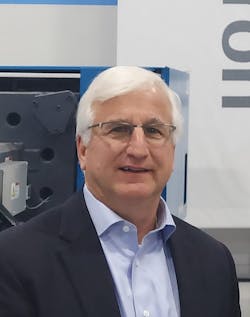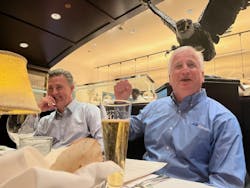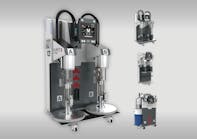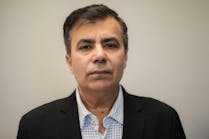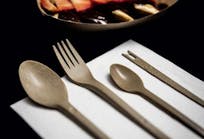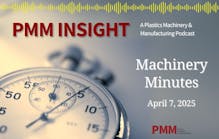By Karen Hanna
Paul Caprio’s father, Arthur, figured his son would be the president of a company one day. He was right — three times over.
Having begun in January his third stint as president of a U.S. affiliate of an injection molding machine maker, Paul Caprio is looking to grow upstart LS Injection Molding Machine North America, a subsidiary of LS Mtron, South Korea. A small player in the U.S. today, the company is planning its big coming-out, nailing down the second-largest booth at NPE2024. It’s also looking to start building machines in the U.S.
The outlook is bright, says Caprio, who came out of retirement to take a job he considers more fun than work — leveraging the relationships he’s built over decades to help customers he considers friends. He spoke recently with Plastics Machinery & Manufacturing Senior Reporter Karen Hanna.
How did you get into plastics?
Caprio: When I got into plastics, I was maybe five years out of school. I was in the sales world, but not in the plastics industry, and I ran across Michael Santacaterina [now head of the Precision Plastics Group at Flex in Buffalo Grove, Ill.] who wanted me to work for his company at the time. It was used equipment and Taiwanese new machinery, and I really knew nothing about the plastics industry, and that’s where I learned everything. That’s actually where I met [now president of LS North America] Peter Gardner; we started one week apart, and that’s who hired me now. We worked together for five years, and then I went to the Germans — I went to KraussMaffei (KM) for 25 years — and he went to the Japanese [DJA Plastic Machinery Division of Daiichi Jitsugyo (America), Inc.], and worked for 25 years. It’s really kind of funny that it’s full circle, that we’re working together again, which is very fun in its own right.
What field did you study in school?
Caprio: Accounting was my degree, and I hated it. I hated it. I worked as an accountant, too, at my first job. That was the last time. That just turned my hair white earlier. My dad told me that would be good to be able to read a financial statement because he knew that I would be in sales and a president of a company. If I had to do it all over again, I don’t think I would have done accounting.
Your dad expected you to become the president of a company?
Caprio: Oh, yeah, I would say so, sure. I think, like most parents, maybe it’s just setting you up to [not] limit yourself. My dad was a president of a medical supply company, so, I think he just assumed that all of his children would be successful because that’s how they raised us. And, you know what, I think there’s some truth to that.
How did you land at LS?
Caprio: I was [at KraussMaffei] for 25 years, and then I took a year off. Then, I was president of Engel for two years. I took a year off; I actually thought I was retiring. It turned out in November of last year, one of my old colleagues that followed me from KM to Engel wanted a different job. I had known Pete Gardner for my whole career. And I recommended this person to reach out to Pete [Gardner] for a job, and Pete called me and said, “Hey, I'll hire this guy, but I would like you to come out of retirement, because we’re going to have some fun here.” He explained what was happening at LS and the story behind [the] business, and it sounded very interesting. And my wife said I was under her feet at home, so she said, “Go back to work.”
When you left Engel, did you anticipate that you’d be returning to work?
Caprio: I was not looking to go back to work. I love playing tennis and golf and walking my dog. I enjoyed doing that for a year. I’m pretty sure I would have enjoyed it for the next 20 years. But my job is, it’s almost a joke to call it work because I enjoy it. I know the industry, I know machinery, I know the customers, I know what people need, in terms of resources, and what their objectives are in production. And my job is putting all those things together with the right people, and it turns into revenue for multiple companies, so it’s really not work to me because I have done it for so long. So [it’s] enjoyable. The people are more friends than anything else. Maybe I’m really fortunate, which I believe I am. It’s not like I’m going into flying an airplane, and I’ve never flown an airplane. It’s a little bit second nature to me, so I’m very fortunate. And I feel like I’m bringing [a] resource to a Korean company that really needs that insight because they just can’t come over to America and jump into our culture without having someone like me. To me, it’s a win-win situation.
You and Gardner worked most of your careers as competitors. Now, you’re selling machines for another company, after spending most of your career at just one company. Was that awkward?
Caprio: We were friendly competitors; I would say most of the competition is friendly competitors. You respect what people do, you respect their advantages, or their pros and cons, and you fight for the customer. I’ve always been a very big advocate of the customer. Everything is around how your customer is able to make more money with your equipment or services. By doing that, you make friends, and you’re always able to help those people throughout your lifetime in the business. So many people welcomed me back. It was very heartwarming, that people have a relationship in the business, and it’s not just profit and loss. It really makes it nice, and I think our industry is really a great place. I’m glad to help the people trying to manufacture goods in America. It really is as simple as that.
It sounds like you’re high on the industry overall.
Caprio: I love it. We’re making things that everybody’s using. Whether it’s an automobile or a laptop, or your cell phone, or medical devices, you can’t go a day without touching a product that is coming off a molding machine. We get a bad rap for pollution, for how terrible plastics is for our environment. It’s really not true. It’s just that you've got to collect the plastic instead of litter, and we do have to do a better job of recycling. But that has to be taught. That’s a responsibility of the industry, as well.
What’s LS’ place in the market?
Caprio: Manufacturing is really going strong on the plastic side and injection molding in particular, and I think the market is more than willing to have another competitor. The world is a little dicey on equipment from China because it just seems like China and America are having a little bit of a fallout, and that’s bringing work back from the molding side. Because of world tensions, maybe people will be more [open] to look at who they’re doing business with for fear of retaliation or parts supply. And that opens up the opportunity for a newer supplier, like LS, to the general market. Korea is really quite attractive because it is an ally of the United States. Korea is really making quite a name for [itself] for higher-end technology in all fields of manufacturing.
Right now, the all-electric equipment is dominated by Japanese manufacturers, and the large-tonnage is dominated more by the Europeans. I think LS has the equipment to fight both battles, and [it’s] a little bit hungrier than the status quo, which means there’s benefits to be had by the end user, because sometimes when people are established, [they] get complacent.
How much growth potential is there?
Caprio: There’s eight Japanese competitors, there’s three German competitors, and there’s a handful of Chinese competitors; there’s a place for all of it. Everybody’s making a living, the customers are surviving, and there’s more to choose from.
I think [having] someone like LS to just take care of a customer — because they don’t have as many of them in America — there’s advantages when you can be small and nimble. The world is made up of a lot of different flavors, and there’s a place for a lot of different ones.
I think LS will find a lot of success in America, and I’ll help them with that. I think the opportunities are going to be great.
We already have many new customers that are only because I had a relationship, and they opened their eyes to what we’re doing and said, “Hey, that looks pretty good.” I think we’re going to multiply that [with] people bringing them on board that either know me or know the market. Then, I’ll take those advantages that we’re bringing to the molder and spread that word.
I’m in the process of hiring sales reps and additional salespeople.
We want to have all of the territories covered, and we just hired a rep agency in the Southeast. Right before I joined, the company had hired a rep agency in the Midwest. We have a couple of direct guys, one in the Northeast and one in the Midwest. We also have a rep in Texas, but I just see us adding reps and direct people to fill in any of the white spaces. That’s going to be another maybe six salespeople.
We’re always looking to add [service people], and we have to figure out how to grow our own because it’s really hard to find people that want to work on equipment.
What do you look for in the people you bring aboard?
Caprio: The very first people that I was involved in bringing on board are people [who] are connected to the industry, so they know who the customers are, what the needs are, and they understand the business. Thankfully, we have a lot of good people in the industry. Some of them left other OEMs because the OEM may not have been as interested in getting new customers. They may be a little bit more complacent; that’s not unusual. A good salesman wants to grow, and they want an OEM that is willing to help spur that growth. I think that’s one thing. The other is we would like some younger people in the industry, because the industry needs that.
What advice would you give to younger salespeople?
Caprio: You’ve got to work hard. The harder you work, the more successful you’ll be. You’ve got to ask questions. You have to be looking out for the good of the customer. That is what counts. That’s what you get rewarded for: If the customer wins, you win. You have to do good, you have to do what’s right; it’s easier said than done. If someone’s getting into sales, or if somebody’s getting into the engineering side, knowledge is everything. The more you’re aware, the more you’re taught — and that can be by mentors or by actual education — that’s always a benefit to anyone. It doesn’t have to be institutional learning, but it has to be where you’re listening and comprehending, and [learning] for the long haul.
What’s your goal for LS?
Caprio: A goal is to be a major player [in the U.S. market], and major means 20 percent. [It’s currently under 10 percent.] It’s not going to take 25 years. It’ll go very quick. We’re tiny right now, so there’s a lot to grow. We have a very established customer base, that tends to be the Korean transplants over here. [There are] roughly 2,000 installed machines in North America, which is a lot of machines. That gives a lot of confidence to the new potential customers that we are not a risk. We are a $30 billion-a-year company with 25,000 employees, and a very, very strong financial company that will be able to support our growth.
We have plans [for] assembling machines in North America. We’re already talking about it internally. The date is within a couple of years. Our company already has manufacturing in North America, through our tractor and automotive business. So, having another assembly plant in America is not a big ask. LS already has more than 4,000 employees in North America. This is an established company; my job is to get enough orders to justify those things.
How long do you plan to stay at LS?
Caprio: I did sign a multi-year agreement. If I’m enjoying what I’m doing — which I am, and it continues — to work another 10 years, it doesn’t feel like work to me. I could see 10 years going by pretty quick.
I would say my first impression, it’s been really, really positive. The whole company is so successful. Yet, they’re very modest. They’re very appreciative of the customer, or any employee’s input. And when customers have special requests, they don’t just say no; they really want to understand what the customer is asking, and then want to fulfill that request. It’s really very nice.
During the course of your career, what are the biggest innovations you’ve seen in the industry?
Caprio: A real obvious one is the transition from hydraulic machines to all-electric machinery. It is not for every application, but it is a tremendous advancement in technology, precision, noise and capabilities. There are servo-hydraulics, and those have advantages, as well, and places where that’s a better fit. At LS, we offer both — all-electric machinery up to 1,000 tons and a servo-hydraulic option from 500 tons to 5,000 tons. That was unique over my timeline, of some people thinking [all-electric machinery] was a fad at first and it would disappear. Seeing that play out to [become] very standard equipment, I would say that was the biggest [advance]. [Additionally,] just the use of automation, from linear robots to full industrial robots to do multiple tasks, that has changed every molding floor, from a person at every machine to a robot at every machine.
What do you think the future will hold?
Caprio: I definitely say this whole chatter about artificial intelligence will become part of the molding machinery, because it is already able to make changes to [adjust to] viscosity changes in the material, when you’re running regrind along with the virgin material. Machines are able to adapt within a shot for consistency and capability.
I think more and more, it’s going to be that you enter some data of your mold and the molding machine will set up all the parameters. Smart factory is a little bit within reach now; the factories are going to get smarter and smarter. That’s very exciting. You really think of a futuristic movie, but it’s really going to be everyday life in a molding plant.
What might that mean for the future workforce?
Caprio: You’re not going to have the low end of labor because … at least I would assume those will become automated tasks, replacing the hourly worker. You’re going to have to have maintenance people [who] are more educated, maybe from a technical school, not necessarily college. Those programs could even be taught by machinery suppliers.
Do you have a plan for bringing in younger people?
Caprio: We will be working with a number of schools. I’ve always done that in my career, by consigning machines. There, you definitely get a constant flow of young people [who] want to be in the industry, and some will be able to fit into the opportunities that we have.
Your father’s expectations for you were pretty high. Did you raise your children the same way?
Caprio: My wife just told me the other day that we’ve been married now 38 years. [We have] five grandchildren, three children, all married; everybody’s doing good. We say, “Our job’s done.” We’re very lucky, very blessed. We raised them — and my wife did a much better job than me — to prepare them to be the best that they can be. Whatever those limitations are, how do you get around it? We for sure expected them to never have a limit [on] their success. It all depends on how you’re going to define success. They’ve all done fantastic and are doing fantastic. Everybody is happy and succeeding, paying the bills, having babies, having a good spouse. I’d say it all adds up really good.
What do you see as your legacy?
Caprio: That’s probably way too big for me to answer. I hope people say, “Hey, that was a fun guy. We had a lot of laughs. He helped us with the business,” and that whoever’s life I touched, it would be in a positive way. Nothing deep. I’m not looking to be in the Plastics Hall of Fame. I’m just trying to make a living, and help people make a living and be successful in business. And, of course, that means the customers’ business, and my employer’s business and everybody touched by that.
Karen Hanna, senior staff reporter
Just the facts
WHO IS HE: Paul Caprio, president of sales for LS Injection Molding Machine North America
AGE: 60
PREVIOUS ROLES: President, Engel U.S. and Canada, 2020-2022; President, KraussMaffei U.S. and Canada, 1994-2019
EDUCATION: Executive Master of Business Administration, Xavier University (Cincinnati); Bachelor of Science degree, accounting, Miami University (Oxford, Ohio)
Karen Hanna | Senior Staff Reporter
Senior Staff Reporter Karen Hanna covers injection molding, molds and tooling, processors, workforce and other topics, and writes features including In Other Words and Problem Solved for Plastics Machinery & Manufacturing, Plastics Recycling and The Journal of Blow Molding. She has more than 15 years of experience in daily and magazine journalism.


